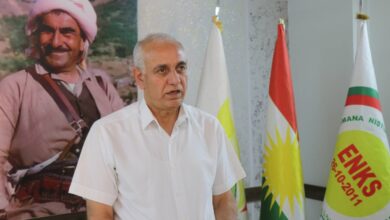
Syria: Stop Undermining UN Investigation
(New York) – The report released on October 27, 2016, by a United Nations-appointed investigation of chemical attacks in Syria has revealed that the government is withholding crucial information that could help identify those responsible for the attacks.
In its fourth report, the Joint Investigative Mechanism between the Organisation for the Prohibition of Chemical Weapons (OPCW) and the UN concluded that Syrian government forces used chemicals in an attack in Idlib in March 2015. In an earlier report, the joint inquiry had reached the same conclusion for two other attacks, in 2014 and 2015. The inquiry also identified the military units responsible for flights connected to the attacks, but it did not name the commanders of the units, citing a lack of information and the failure of the Syrian government to respond to crucial queries.
“Evidence is mounting that the Syrian government is deliberately trying to block accountability for its forces’ chemical attacks and derail a UN-appointed investigation,” said Louis Charbonneau, UN director at Human Rights Watch. “But not having the names of those directly involved should not stop the Security Council from imposing sanctions on senior leaders in the chain of command that have, at best, allowed this to happen on their watch.”
Syrian authorities said that they had reviewed data on flight plans and air operation-related information, but they have not provided that information to the inquiry and they had previously denied possessing it, the inquiry said. That information would be crucial to identifying individuals responsible for the attacks to hold them to account for their actions, with targeted sanctions as a first step, Human Rights Watch said.
The Security Council discussed the report behind closed doors on October 27. In a speech to the council, Russia’s ambassador to the UN appeared to dismiss the need for the Security Council to act on the report’s finding, calling instead on the Syrian government to conduct a national investigation of the chemical attacks confirmed by the inquiry.
Russia has blocked a Security Council resolution to provide accountability for crimes in Syria by referring the situation to the International Criminal Court. A Russian veto of sanctions on those responsible for chemical attacks would be yet another reason for UN member states to request a General Assembly emergency special session on Syria, Human Rights Watch said. Such a session could, among other things, mandate an investigative mechanism to gather and preserve evidence for use in any credible future criminal prosecution – whether at the national or international level – of serious crimes committed in Syria.
Evidence is mounting that the Syrian government is deliberately trying to block accountability for its forces’ chemical attacks and derail a UN-appointed investigation. But not having the names of those directly involved should not stop the Security Council from imposing sanctions on senior leaders in the chain of command that have, at best, allowed this to happen on their watch.
Louis Charbonneau
UN Director at Human Rights Watch
On August 7, 2015, the Security Council unanimously adopted Resolution 2235, establishing the Joint Investigative Mechanism between the Organisation for the Prohibition of Chemical Weapons (OPCW) and the UN to “identify to the greatest extent feasible individuals, entities, groups, or governments who were perpetrators, organisers, sponsors or otherwise involved in the use of chemicals as weapons.”
The inquiry confirmed Human Rights Watch findings at the time, in reports in May 2014and April 2015, which concluded that government forces were most likely responsible for the three attacks, among several similar incidents.
The inquiry also previously found that the Islamic State (also known as ISIS) had used sulfur mustard gas in an attack on areas held by armed opposition groups in August 2015. In its fourth report, the inquiry also said it had received 13 allegations of possession, movement, and intent to use chemical weapons by non-state actors in Syria. ISIS is already under UN sanctions.
The Syrian government forces’ unlawful chemical attacks appear to continue, Human Rights Watch said. Human Rights Watch has documented Syrian government forces’ likely use of chemicals in attacks in Aleppo in August and September 2016. Bellingcat, a citizen investigative journalist group, has collected information about a likely government chemical attack in early October.
Human Rights Watch has previously called on the Security Council to extend and, if needed, expand the mandate of the joint inquiry, impose sanctions on the Syrian government for chemical weapon attacks in Syria, and refer the situation to the International Criminal Court.
In a 2013 resolution approved after a Sarin chemical attack in the Ghouta suburbs of Damascus killed hundreds of civilians, the Security Council agreed to impose measures under Chapter 7 of the UN Charter if chemical weapons were used again in Syria.
The Chemical Weapons Convention, which Syria ratified on October 14, 2013, prohibits attacks that use industrial chemicals such as chlorine as a weapon. Among other obligations, each member country agrees never to “assist, encourage or induce, in any way, anyone to engage in any activity prohibited to a State Party under this Convention.” The laws of war applicable in Syria prohibit the use of chemical weapons. The use of such prohibited weapons with criminal intent – that is, deliberately or recklessly – is a war crime.
When the Security Council established the joint inquiry, Russia said it would close the gap in identifying those responsible for the use of chlorine as a weapon in Syria.
“Russia has supported all Security Council resolutions on the use of chemical weapons in Syria, including the one that tasked this investigation with establishing individual responsibility,” Charbonneau said. “It would be a disgrace if Russia blocks Security Council action just because the investigation it ordered came back with a conclusion it didn’t like.”
www.hrw.org




